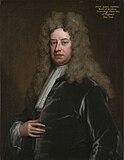1708 British general election
| ||||||||||||||||||||||
All 558 seats in the House of Commons 280 seats needed for a majority | ||||||||||||||||||||||
|---|---|---|---|---|---|---|---|---|---|---|---|---|---|---|---|---|---|---|---|---|---|---|
| ||||||||||||||||||||||
 The House of Commons following the 1708 General Election | ||||||||||||||||||||||
The 1708 British general election was the first general election to be held after the Acts of Union had united the Parliaments of England and Scotland.
The election saw the Whigs gain a majority in the House of Commons, and by November the Whig-dominated parliament had succeeded in pressuring the Queen into accepting the Junto into government for the first time since the late 1690s. The Whigs were unable to take full control of the government, however, owing to the continued presence of the moderate Tory Godolphin in the cabinet and the opposition of the Queen. Contests were held in 95 of the 269 English and Welsh constituencies and 28 of the 45 Scottish constituencies.
Summary of the constituencies
[edit]In England, there was 513 MPs elected from 245 constituencies (203 boroughs, 40 counties, and 2 universities). In Wales, there was 24 MPs from 24 constituencies. In Scotland, there was 45 MPs from 45 constituencies (30 counties and 15 burghs)[1]
Dates of election
[edit]The first general election held since the Union took place between 30 April 1708 and 7 July 1708. At this period elections did not take place at the same time in every constituency. The returning officer in each county or borough fixed the precise date (see hustings for details of the conduct of the elections).
Results
[edit]In England and Wales, the Whigs Took 268 seats and the Tories took 225, with 20 unclassified. the 45 in Scotland could be classified as ministerial supporters.[2]
Seats summary
[edit]See also
[edit]- List of parliaments of Great Britain
- 2nd Parliament of Great Britain
- List of MPs elected in the British general election, 1708
References
[edit]- ^ "Constituencies 1690-1715 | History of Parliament Online". www.historyofparliamentonline.org. Retrieved 2 September 2024.
- ^ "1708 | History of Parliament Online". www.historyofparliamentonline.org. Retrieved 2 September 2024.
- British Electoral Facts 1832–1999, compiled and edited by Colin Rallings and Michael Thrasher (Ashgate Publishing Ltd 2000). (For dates of elections before 1832, see the footnote to Table 5.02).
External links
[edit]



